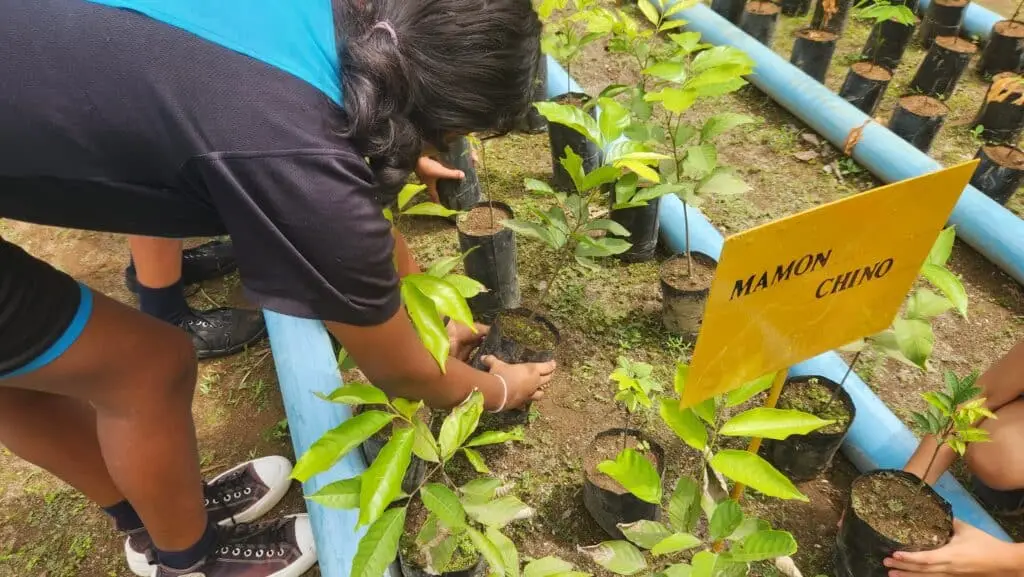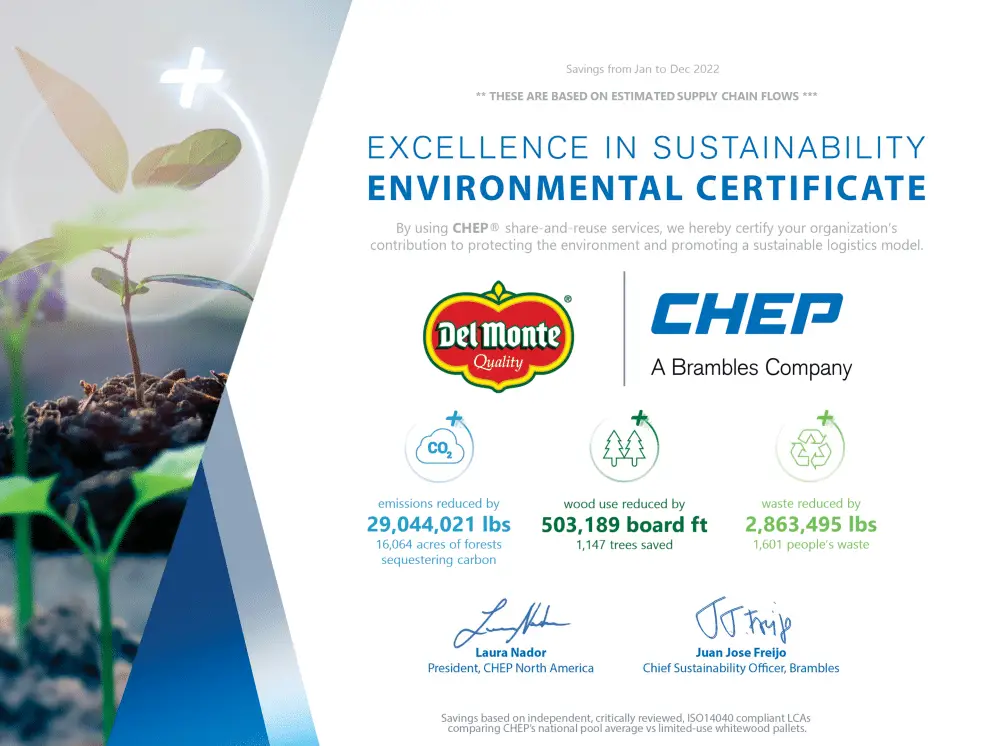The challenge: Threatened soil health
Water conservation and carbon emissions are often at the forefront of sustainability conversations, but equally important to the conversation is soil health and management. Soil is a fragile formation of interacting layers oforganic matter, mineral particles, living organisms, air, and water that build over time. Closest to the surface is the topsoil, with a higher concentration of organic matter containing essential nutrients for crops. Simply put, without healthy soil, there would be no food to sustain the world’s population. While soil may seem a robust and infinite natural resource, scientists across the globe indicate that soil function and health are severely threatened by compounding threats of intensifying soil degradation—erosion, fertility loss, salinity, acidification, compaction and the loss of soil carbon.
Globally, soil degradation has resulted in the loss of up to 2.3 million hectares of productive agricultural land. These losses primarily stem from excessive land clearing, poor management practices, and deforestation. Deforestation, in particular, has a profound impact as trees and root systems serve as physical barriers preventing erosion and preserving the valuable ecosystems that lie within them. Excessive soil erosion and deforestation negatively alter the capacity of the soil to support food production and still provide ecosystem services.
Without the right management approaches, soil preparation, fertilization and drainage can have a significant impact on soil health and the long-term sustainability of agriculture production. Disturbances to the soil through land degradation and poor management practices break down well-established biomes, resulting in the need to re-establish the ecosystem to make the soil conducive to planting. This is not ideal as it is more efficient and cost-effective to maintain healthy biomes than it is to rebuild them.
Additionally, soil is a critical component of the carbon cycle; it contains at least twice as much carbon as the atmosphere. Ensuring that healthy soil is able to sequester carbon dioxide from the atmosphere is crucial to avoiding the worst impacts of global climate change. As an agricultural company, Fresh Del Monte is already seeing the firsthand impacts of climate change on the ground; in 2020, their growing regions in Costa Rica and Guatemala faced two major hurricanes in 2020—Hurricane Eta and Hurricane Iota—that resulted in devastating flooding and the loss of substantial farmland, homes, community infrastructure and beneficial biomes.
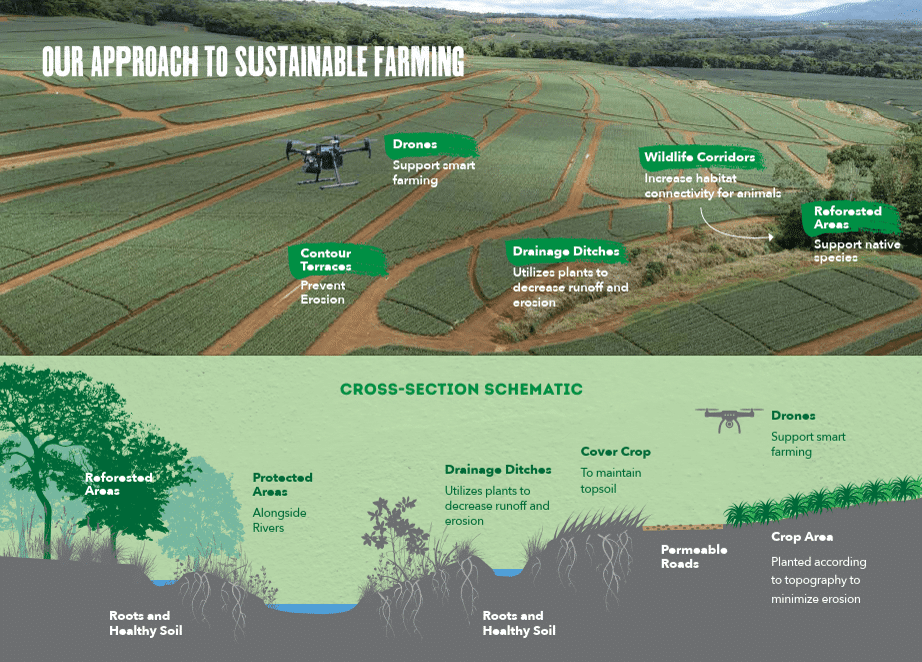
The solution: A Responsible Farming Approach
Fresh Del Monte views their agricultural landscapes as functional ecosystems and aims to secure healthy food choices for consumers around the world while conserving biodiversity. Responsible farming begins before their operations are even developed: the team undergoes a rigorous assessment to ensure the land proposed for agricultural development can meet the company’s stringent standards for growing responsibly.
Fresh Del Monte has an experienced team of Research & Development personnel in all of their major operations that are responsible for monitoring soil preparation, soil fertility and water management. They work to ensure their soils are within the adequate levels required for sustainable production in order to prevent the deterioration of soil health. The same teams provide technical recommendations and adjust these programs according to the results of laboratory analyses.
Fresh Del Monte implements strict soil and land management practices to mitigate factors that increase the severity of erosion for many years. Key actions include developing farms on low slopes to reduce runoff and soil loss, planting on contour terraces, using cover crops to improve soil structure and water retention, and building sediment catchment pits. Further, Fresh Del Monte preserves forest areas and enacts reforestation programs on the edges of farms, near waterways, to protect watersheds. However, the work is never complete. The team continues to collaborate with academic experts and students from local universities on research into erosion, to develop and adopt new, more efficient practices and technologies.
Hans Sauter, Fresh Del Monte Chief Sustainability Officer and Vice President of Corporate Research & Development, Quality Assurance and Agriculture explains that, with regard to soil maintenance, “…first you protect what you have before you talk about regenerating and recovering. If you have degraded [the soil], then you need to recover.” Retaining the nutrients that are naturally in the soil is far more efficient than replacing lost nutrients.
Striking a balance between maintaining efficiencies while sustainably conserving the ecosystem can be challenging. Digital topography tools are used by Fresh Del Monte to provide thousands of visual data points to simplify the process of mapping and scoping the land. This data is then used to design fields that work in concert with the natural contours of the land to avoid or reduce the speed of water flow and keep erosion to a minimum. Field design is a trial-and-error process that takes time, and fields can go through several design iterations. Fresh Del Monte carefully monitors the results each season to see what worked best and what didn’t work, which provides a solid foundation to improve upon, not only for the next season but for increased productivity over the long term.
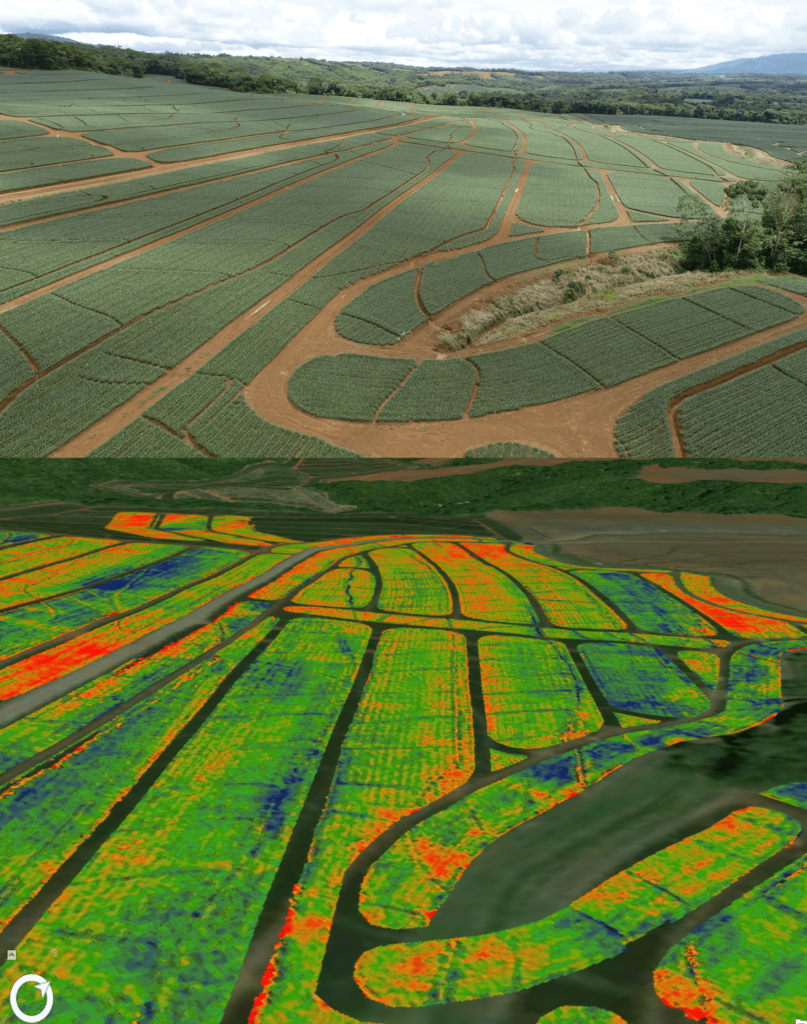
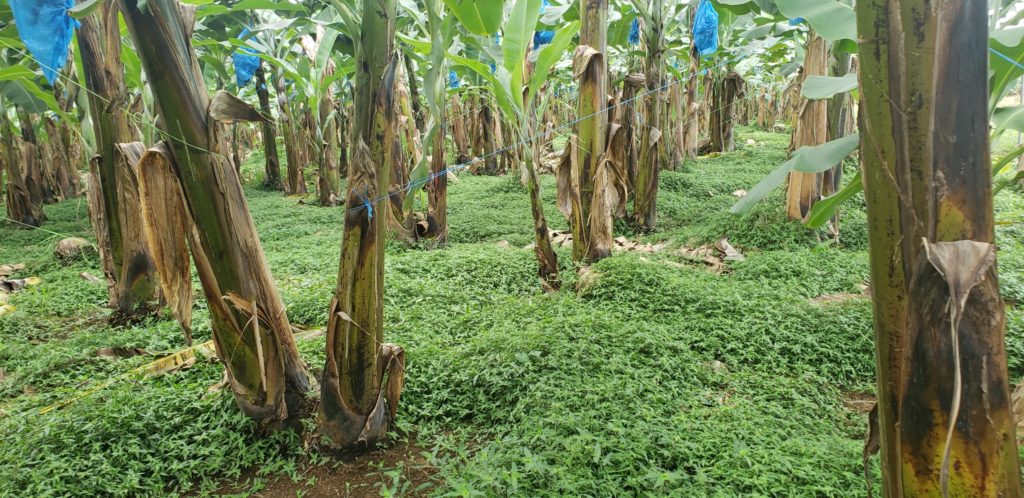
Taking a crop-specific approach
For perennial crops like bananas, where soil microflora are more easily maintained, Fresh Del Monte utilizes a field design that works with soil texture and topography to maintain ideal soil moisture and water table levels. On pineapple farms, they ensure the slope of drainage canals is engineered in a way that minimizes erosion. [HS1] [WLL2] They also bring barriers into the canals to capture the soil runoff, keeping it from washing from the watershed into lakes, streams and rivers. In addition, the use of cover crops is fundamental in fighting erosion in these types of tropical landscapes.
With shorter lived fruit-producing plants like pineapples and melons, the capacity of soil to function as a vital living system is necessary to sustain plant productivity. These types of plants are susceptible to root damage and require soil management at the microbial level to protect against soil-borne pathogens and nutrient deficiency.
Preventing the global spread of disease: Novel solutions
Fresh Del Monte strives to prevent the arrival of major pests and diseases into their operations through the implementation of strict policies on pest and pathogen exclusion and quarantine measures. They diligently work with governments and local institutions in countries where they operate to establish industry-wide measures to prevent the entrance of new pathogens.
Fresh Del Monte also utilizes cutting edge technologies to prevent pests and diseases in sustainable way. In their melon research lab in Costa Rica, they grow and reproduce beneficial soil microorganisms. They then inoculate the soil at the beginning of each growing cycle to increase the population of these beneficial microorganisms. Repopulating the soil in this way helps maintain the fields for a longer period of time against microorganisms that attack the plants at their roots.
Inoculation is used in conjunction with solarization technology, where the soil is covered and accumulates heat from the sun to control pathogens and other vectors left behind from the previous crop. Soil fertility is constantly monitored, ensuring that the soil is replenished when needed and the microbiomes are favorable for the incoming crop and the crop that follows.
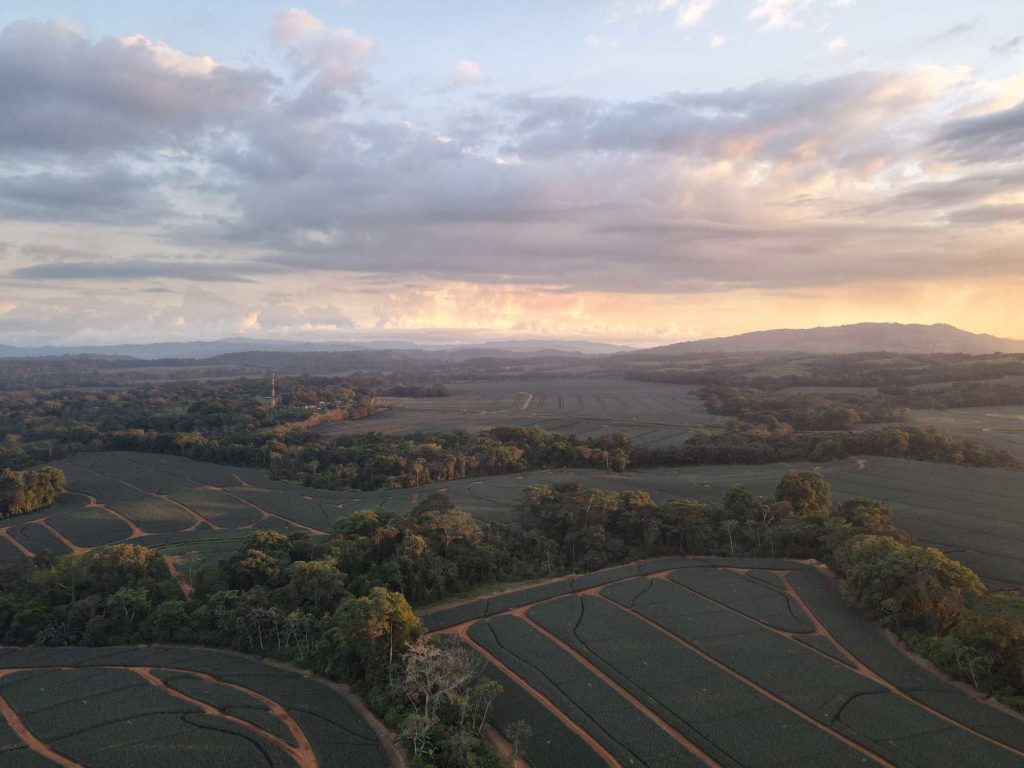
The takeaway: Healthier soil and a better relationship with the land
Soil health, landscape conservation and restoration are key factors in yielding fresh quality produce. There are many efficiencies to be gained and, because farming is so intensive in terms of inputs, moving toward precision agriculture is one of the ways into the future. Farm landscapes are never perfectly uniform, and tending to the specific needs of each acre makes all the difference in agrochemical use. And that happens to work in favor of the environment and to help everyone’s costs.
Beginning the journey toward environmental sustainability and landscape management is an investment—but it is an investment in the future of the industry and in the future of the planet. In this case, soil resiliency is the payoff to that investment—which is becoming crucial, especially in the age of climate change.
The bottom line is this: The better you care for the soil and land, the higher yields you get, and higher yields equal larger margins and lower costs.
The process is gradual and occurs over time, and keeping records and looking at trends makes a difference. Fresh Del Monte closely follows their yields on an annual basis to try to better understand what practices are working and which need to be fine-tuned.
Since 2016, Fresh Del Monte has planted over a million trees in the communities in which they operate with a goal of 2.5 million by 2025. Their conservation program has preserved nearly 10,000 hectares of protected forests, which amounts to around 26,000 acres, close to 28% of their land. These measures help protect against erosion and increase the overall health and resiliency of the landscape by supplying oxygen, clean air, and water, sequestering carbon from the atmosphere and supporting the pollination of plants, among other life-supporting benefits.
Regarding sustainability overall, Sauter explains, “consumers are demanding it. It’s no longer whether you want it or the government is imposing it on you—consumers are demanding it. You will need to engage, and the sooner the better to protect our planet and communities.”

